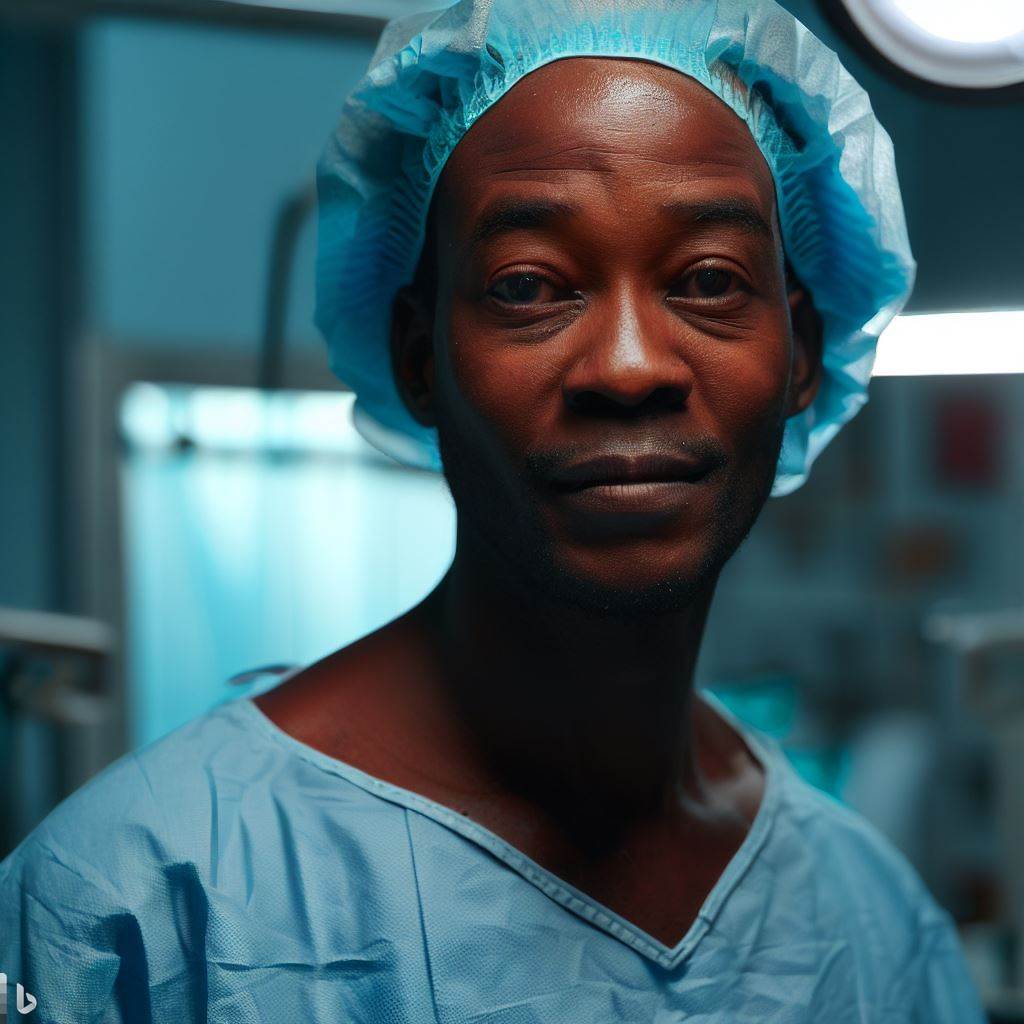Introduction
In this blog post, we will take a closer look at the day-to-day life of a surgeon in Nigeria.
Understanding the challenges and responsibilities faced by surgeons in Nigeria is vital to appreciate their contribution to the healthcare system.
Overview of Surgery in Nigeria
General Overview of the Surgical Field in Nigeria
Surgery is a critical aspect of healthcare in Nigeria, involving various specialties and subspecialties. Surgeons play a vital role in treating diseases and injuries through surgical interventions.
The surgical field in Nigeria encompasses a wide range of procedures, including general surgery, orthopedics, neurosurgery, and cardiothoracic surgery.
Challenges and Opportunities Faced by Surgeons in Nigeria
Limited resources and infrastructure pose significant challenges for surgeons in Nigeria. Surgeons often struggle with a lack of basic medical supplies, surgical equipment, and advanced technology.
Inadequate funding for healthcare and low surgeon-to-patient ratio further intensify the challenges faced by surgeons.
However, there are opportunities for growth and improvement in the surgical field, with initiatives focused on training and capacity building.
Surgeons in Nigeria have the chance to make a significant impact on healthcare delivery and contribute to medical advancements.
Significance of the Healthcare System in Relation to Surgical Practice
The healthcare system in Nigeria serves as the backbone for surgical practice in the country. An efficient and well-maintained healthcare system is crucial for supporting surgeons in providing quality care.
Adequate investment in healthcare infrastructure, staffing, and training programs is essential for the growth of surgical practice.
Improved healthcare policies and regulations can enhance the overall surgical experience for both surgeons and patients.
Collaboration between surgeons and other healthcare professionals is vital for a comprehensive and effective healthcare system.
In the end, the surgical field in Nigeria faces significant challenges due to limited resources and infrastructure.
However, there are opportunities for growth and improvement in surgical practice. The healthcare system plays a critical role in supporting surgeons and ensuring quality care delivery.
With proper investment and collaboration, surgeons in Nigeria can contribute to improving healthcare outcomes and making a lasting impact on the field of surgery.
Read: The Role of MRI Techs in Nigeria’s Public vs. Private Sector
Education and Training
The educational pathway to becoming a surgeon in Nigeria
Obtain a Bachelor of Medicine, Bachelor of Surgery (MBBS) degree from a recognized Nigerian university. Complete a mandatory one-year internship program in a teaching hospital or medical center.
Pass the Medical and Dental Council of Nigeria (MDCN) licensing examination to become a registered medical practitioner.
Choose a specialty pathway, such as surgery, and enroll in a postgraduate residency program.
During the residency program, individuals undergo comprehensive training in various surgical techniques, procedures, and patient care.
Surgeons-in-training rotate through different surgical subspecialties, including general surgery, orthopedic surgery, cardiovascular surgery, etc.
After completion of the residency program, aspiring surgeons must pass the National Postgraduate Medical College Fellowship examination in their chosen specialty.
Attaining the Fellowship of the National Postgraduate Medical College (FMCS) or its equivalent qualifies individuals to practice independently as surgeons in Nigeria.
The duration and requirements of undergraduate and postgraduate training
Undergraduate Training
- Duration: Typically 6 years, including a one-year internship program.
- Requirements: High school completion and successful completion of the university entrance examination.
Postgraduate Training (Residency Program)
- Duration: Varies depending on the chosen specialty, but usually ranges from 4 to 6 years.
- Requirements: Completion of the MBBS degree, a one-year internship, and successful acceptance into a postgraduate program.
The importance of continuous professional development in the field
Continuous professional development (CPD) is essential for surgeons to stay updated with the latest advancements in surgical techniques, technologies, and research findings.
The field of medicine, including surgery, is constantly evolving, and CPD ensures that surgeons provide the best possible care to their patients.
Benefits of CPD:
- Enhances surgical skills and knowledge, leading to improved patient outcomes.
- Helps surgeons stay abreast of new surgical techniques, equipment, and treatment options.
- Promotes professional growth and career advancement.
- Fosters collaboration and networking with other healthcare professionals.
- Allows surgeons to meet mandatory continuing professional development requirements set by medical regulatory bodies.
- Encourages lifelong learning and a commitment to excellence in surgical practice.
CPD activities for surgeons may include attending conferences, workshops, and seminars, participating in surgical simulation training, engaging in research projects, publishing scientific papers, and maintaining memberships in professional organizations.
In fact, becoming a surgeon in Nigeria requires completing a medical degree, a one-year internship, and postgraduate residency training.
Continuous professional development is crucial for surgeons to stay updated and provide the best possible care to patients.
Read: Nigeria’s Surgeon Workforce: A Critical Examination
Typical Working Environment
A surgeon in Nigeria operates in a demanding and fast-paced working environment that requires immense focus and commitment. The job involves long hours of work and a high level of dedication.
Hospital Settings
In Nigeria, surgeons work in various hospital settings, including both public and private sectors.
Public hospitals are government-owned and cater to a large section of the population, while private hospitals serve those who can afford specialized healthcare.
Public hospitals often have a higher patient load, resulting in a more hectic and pressured working environment.
Surgeons in public hospitals deal with a wide range of cases, including emergency surgeries and complex procedures. In contrast, private hospitals generally offer better facilities and resources
Surgeons working in private hospitals may have access to advanced technology and equipment, leading to a more efficient and comfortable working environment.
Availability of Resources and Facilities
When it comes to resources and facilities, the situation in Nigerian hospitals can be challenging.
Both public and private hospitals often face shortages in essential supplies, such as surgical instruments, medications, and even electricity.
Public hospitals, in particular, struggle with limited budgets and inadequate infrastructure. Surgeons may have to deal with outdated or malfunctioning equipment, leading to delays and compromised patient care.
In private hospitals, the availability of resources and facilities depends on the hospital’s financial status.
Well-established private hospitals may offer better-equipped operating theaters, advanced imaging facilities, and well-stocked pharmacies.
However, even in private hospitals, there can be disparities in resource allocation, with some facilities lacking certain essentials.
Surgeons in Nigeria often have to adapt and work with limited resources, making the best of the available options.
Moreover, due to the limited number of surgeons in the country, they may need to multitask and cover different specialties, further adding to their workload and responsibilities.
Challenges and Rewards
Working as a surgeon in Nigeria presents numerous challenges, but it also comes with its rewards.
Surgeons have the opportunity to make a significant impact on patients’ lives, providing life-saving interventions and improving health outcomes.
Despite the challenges, surgeons in Nigeria demonstrate resilience and dedication to delivering quality healthcare.
They often work in collaboration with other healthcare professionals, such as nurses, anesthesiologists, and radiologists, to provide comprehensive care to patients.
Additionally, being a surgeon in Nigeria allows for continuous professional growth and development.
Surgeons may attend conferences, workshops, and seminars to stay updated with the latest advancements in their field.
The working environment for surgeons in Nigeria is intense and demanding. They operate in various hospital settings, facing challenges related to resource availability and infrastructure.
However, despite these hurdles, Nigerian surgeons remain committed to their profession and strive to provide the best possible care to their patients.
Their passion and dedication contribute significantly to the improvement of healthcare in the country.
Read: Gender Dynamics in the Nigerian MRI Technologist Field

Daily Routine and Responsibilities
Insight into the daily routine of a surgeon in Nigeria
As a surgeon in Nigeria, each day starts early with a thorough review of the scheduled surgeries and patient consultations.
The day begins with rounds, discussing patient cases and reviewing medical records with the surgical team.
Surgeries are performed throughout the day, with each procedure requiring careful concentration, precision, and adherence to safety protocols.
Between surgeries, surgeons may have time for quick breaks, which are often used for meetings and discussions with other healthcare professionals.
Afternoon consultations are scheduled to meet with patients, explain diagnoses, and discuss surgical options.
Apart from surgeries and consultations, surgeons also spend significant time on administrative tasks such as documenting patient information and updating records.
The range of responsibilities, such as patient consultations, surgeries, and follow-up care
Patient consultations form a significant part of a surgeon’s responsibilities, where they assess medical conditions, discuss treatment options, and address patient concerns.
Surgeons perform a wide variety of surgeries, depending on their specialization, ranging from minor procedures to complex operations.
Post-operative care, including monitoring patients’ progress, managing pain, and addressing complications, is crucial for ensuring successful recoveries.
Follow-up care involves evaluating the effectiveness of surgeries, assessing healing progress, and addressing any post-surgical complications.
Surgeons also collaborate with other healthcare professionals, such as anesthesiologists and nurses, during surgeries and post-operative care.
The importance of teamwork and collaboration in surgical practice
Teamwork and collaboration are vital in surgical practice in Nigeria as they improve patient outcomes and ensure efficient workflows.
Surgeons work closely with other members of the surgical team, such as nurses, anesthesiologists, and surgical assistants, to ensure seamless coordination.
Collaboration allows for effective pre-operative planning, reducing the risk of errors during surgeries and enhancing patient safety.
During surgeries, clear communication within the team is crucial to ensure everyone is aware of the procedure’s progress and any potential complications.
Team members support each other in tasks such as handovers, instrument handling, and maintaining sterile environments.
Collaboration extends beyond the operating room, with surgeons working closely with other healthcare professionals for comprehensive patient care.
In a nutshell, the daily routine of a surgeon in Nigeria is filled with patient consultations, performing surgeries, and providing follow-up care.
Teamwork and collaboration are crucial for successful surgical practice, ensuring optimal patient outcomes and efficient workflows.
Read: The State of Surgical Equipment and Facilities in Nigeria
Challenges and Rewards of Being a Surgeon in Nigeria
Challenges Faced by Surgeons in Nigeria
- Limited resources: Surgeons in Nigeria often face challenges due to the limited availability of resources such as medical equipment, surgical supplies, and medication.
- Inadequate infrastructure: The lack of proper infrastructure, including well-equipped hospitals and operating theaters, poses significant challenges for surgeons in Nigeria.
- High patient influx: Surgeons in Nigeria have to deal with a high influx of patients, which can overwhelm the healthcare system and impact the quality of care they can provide.
- Lack of funding: Limited funding in the healthcare sector affects surgeons’ ability to access necessary training, attend conferences, and stay updated with the latest surgical techniques.
- Infection control: Maintaining proper infection control practices can be challenging in Nigeria due to factors such as poor sanitation, limited access to clean water, and overcrowded healthcare facilities.
Personal and Professional Rewards of Being a Surgeon in Nigeria
- Saving lives: One of the most rewarding aspects of being a surgeon in Nigeria is the opportunity to save lives and make a significant impact on patients’ well-being.
- Making a difference in the community: Surgeons play a crucial role in addressing healthcare disparities and improving the overall health of the community they serve.
- Professional growth: Despite the challenges, being a surgeon in Nigeria offers opportunities for professional growth through continuous learning, acquiring new skills, and adapting to different medical situations.
- Fulfilling patient relationships: Surgeons develop strong bonds with their patients, providing them with emotional support and reassurance during difficult times, which can be deeply rewarding.
- Mentorship and teaching: Experienced surgeons in Nigeria have the opportunity to mentor and train younger doctors, passing on their knowledge and skills, and contributing to the development of the medical profession.
Career Growth and Specialization Opportunities
- Advanced surgical techniques: Surgeons in Nigeria have the chance to learn and practice advanced surgical techniques to provide better patient outcomes.
- Specialization options: There are various specialization options available for surgeons in Nigeria, including cardiovascular surgery, neurosurgery, orthopedic surgery, and pediatric surgery.
- Research and innovation: Surgeons can actively participate in research and contribute to medical advancements, leading to further career growth and recognition within the field.
- International collaborations: Surgeons in Nigeria can collaborate with international medical organizations, opening doors for networking, exchange programs, and knowledge sharing.
- Leadership roles: With experience and expertise, surgeons in Nigeria can take up leadership roles within hospitals and healthcare organizations, influencing policy decisions and improving the healthcare system.
In short, being a surgeon in Nigeria comes with its fair share of challenges, ranging from limited resources to inadequate infrastructure.
However, the personal and professional rewards, such as saving lives, making a difference in the community, and opportunities for career growth, make it a fulfilling and respected profession in the country.
Surgeons in Nigeria have the chance to contribute to the development of the healthcare system and improve patient outcomes through their dedication and expertise.
Read: The Path to Becoming a Surgeon in Nigeria
Impact on Patient’s Lives
As a surgeon in Nigeria, my role is crucial in enhancing patient outcomes and their quality of life. Every day, I witness the incredible impact that surgeons have on their patients.
One memorable story involves a young boy named Ahmed who came to our hospital with a severe hand injury.
His hand had been caught in a machine at his father’s factory, leaving his fingers mangled and non-functional.
Ahmed’s case required delicate surgery to reconstruct his hand and restore its functionality. As his surgeon, I worked tirelessly alongside a dedicated medical team for a successful outcome.
After months of intense rehabilitation, Ahmed’s hand gradually regained mobility. Seeing the joy on his face as he held a spoon for the first time since the accident was indescribable.
Such experiences are not unique. Surgeons in Nigeria regularly encounter patients from all walks of life who rely on us to improve their health and well-being.
From life-saving emergency procedures to complex surgeries, surgeons play a pivotal role in changing lives. Beyond technical expertise, there is a deep aspect of trust that patients place in their surgeons.
They seek reassurance that we have the expertise and empathy needed to guide them through their medical journey.
Building a strong surgeon-patient relationship is vital for effective communication and understanding. I take great pride in establishing this trust, as it allows me to provide the best possible care.
One such case involved Mrs. Adeleke, a woman needing major abdominal surgery. Through careful discussions, I eased her concerns and gained her trust.
Every successful surgery reinforces the impact we have on patients’ lives. It’s not just about technical skills, but the genuine care and compassion we offer.
We celebrate each victory alongside our patients, knowing their lives have been forever changed.
Being a surgeon in Nigeria has its challenges, but the rewards far outweigh the hardships. The knowledge that we positively impact our patients’ lives drives and inspires us to continue our work passionately.
Read: The Journey to Becoming a Registered Nurse in Nigeria
Gain More Insights: The Role of Psychologists in Nigeria’s Healthcare System
Conclusion
This blog post provided an inside look into the day-to-day life of a surgeon in Nigeria. It highlighted the challenges they face, such as limited resources and long working hours.
Understanding their experiences is crucial in appreciating their dedication and commitment to saving lives. Surgeons in Nigeria work tirelessly to provide healthcare despite various obstacles.
It is important for readers to recognize and value their hard work and to support efforts to improve healthcare infrastructure in the country.
By doing so, we can contribute to the betterment of healthcare services and ultimately save more lives in Nigeria.




